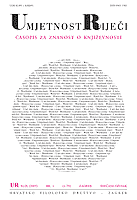Plorantis Croatie saecula duo. Diskurzivne adaptacije i performativne funkcije marijanskog toposa
Plorantis Croatie saecula duo. Discursive Adaptations and Performative Functions of Marian Cult
Author(s): Zrinka BlaževićSubject(s): Language and Literature Studies
Published by: Hrvatsko filološko društvo
Summary/Abstract: Plorantis Croatiae saecula duo is a little known narrative lyric written by the Croatian poet and polymath Pavao Ritter Vitezović (1652–1713), published in Zagreb in 1703. The poem has an interesting narrative structure, a personified Croatia describing her own history during the 16th and 17th century, much affected by Ottoman conquests. The most prominent feature of Vitezović’s poetic discourse is the gender rift between the author and the enunciatory subject, the personified Croatia/Patria metaphorically identified with Woman/Mother. Narrating in the first person, Croatia presents a kind of ’ego-history of mourning’ during the two centuries of Ottoman conquests. This renders the whole poem an exercise in the form of (pseudo)autobiography. Simultaneously, it is an allegory, alluding to the popular Baroque Marian cult. This paper will focus on Vitezović’s poetic procedures and narrative strategies as well as overall features of the discursive adaptations of this topos. Situating the poem in its broader political and cultural context, the paper examines the ideological connotations and performative functions of the adapted topos. These functions range from the affective profession of the baroque pietas and express a wide range of feeling ranging from loyalty to the ruler to the awakening of patriotism in the audience, mobilizing these for the anti-Ottoman war of liberation.
Journal: Umjetnost riječi
- Issue Year: 2005
- Issue No: 1
- Page Range: 37-47
- Page Count: 12
- Language: Croatian

